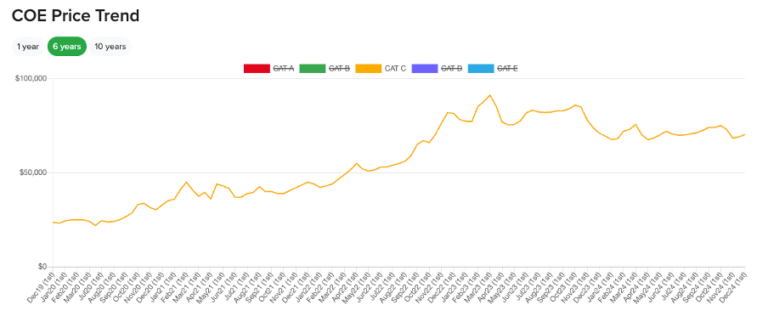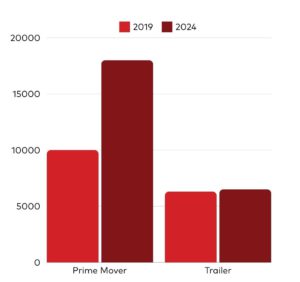Trucking Costs in Singapore 2024
In 2024, the costs of operating a trucking business in Singapore has increased significantly is still influenced by these main factors:
- vehicle-related expenses,
- industry-specific costs,
- labour, and
- facility-related overheads.
Here’s an overview of each category and the trends impacting them.
To Purchase or to Lease?
Prime movers and trailers are two separate costs that businesses need to take into consideration. Businesses can choose to purchase or lease these assets, depending on what’s chosen the costs will vary.
Purchasing
1. Cost of COE
Certificate of Entitlement (COE) prices has been rising steadily over the years for all categories. The lowest COE for under Category C (goods vehicles and buses), seen was in March 2020 at S$22,002 and highest recorded was in March 2023 at S$91,101.
As of December 2024 first bidding, COE for a prime mover in Singapore, is priced at S$70,289. This category’s price has remained fairly steady in recent months, although prices may fluctuate depending on market dynamics such as vehicle deregistration and bidding demands.

2. Vehicle Cost
Depending on brand, model and payload, the range of a normal prime mover ranges from S$130K to S$200K before COE.2.
3. Trailer Cost
Depending on size, brand and model, the range for a trailer ranges from S$15K to S$28K. COE is not required for a purchase of trailer.
Leasing
Note: Rental costs would depend on various factors such as quantity and time period.
1. Monthly Vehicle Rental: Approximately from S$4K onwards per truck per month
2. Trailer Rental: Approximately $50/day or more
Repairs and Maintenance
Repairs & maintenance of vehicles and their parts depends largely on the age of the fleet and usage of the prime mover.
For heavy vehicles, one of the main expenses for repairs and maintenance is tires. For tire usage, it may be more taxing due to the weight of the cargo, long distances travelled and the conditions of the roads. It must be changed regularly to ensure the safety of both drivers and the public.
Depending on usage and type of vehicle:
- Prime movers change 2 sets of tyres (6-8 tyres) a year
- Trailers change 1 set of tyres (8-12 tyres) every 2 years

Based on the age of the vehicle, the cost of maintenance can cost around S$18K per truck per year. Not forgetting the costs of maintenance for trailers, which ranges around S$6.5K per trailer per month.
However, some bigger trucking companies can afford to have in-house repair or maintenance services, which can help to reduce the maintenance costs.
Fuel
As of December 2024, the fuel prices in Singapore is as follows:
Diesel: SGD 2.58 to SGD 2.60 per litre
These fuel cost fluctuations directly impact the operating expenses for trucking businesses in Singapore, especially considering diesel’s importance for logistics operations.
An average prime mover utilizes about 2000-3000L a month per truck, depending on distance travelled for the jobs taken. This equates to a cost of approximately S$4,940-S$7,890 per truck per month, pegged to the commercial price of diesel.
Road Tax
Road tax is payable for both prime movers and trailers. To get an accurate sum of road tax payable, users can refer to onemotoring website.
Price of road tax for a prime mover depends on the vehicle’s maximum laden weight (MLW). For diesel prime movers, this can range from $553 (MLW of between 16 to 20) to $1,488 (MLW above 55). For vehicles of more than 10 years old, there will be a road tax surcharge on top of the vehicle’s original road tax.
Similarly for trailers, the price of road tax for a trailer is based on the maximum laden weight (MLW) of the vehicle. This ranges from S$120 or more per year.
Insurance
In Singapore, all assets must be insured in order to be deployed on the roads. The costs payable for both prime movers and trailers is determined by the age of the assets and increases over the age of the assets.
- Prime movers: ~S$4,500 per prime mover per year
- Trailers: ~S$1,200 per trailer per year
Parking
Parking at HDB lots is limited to prime movers only. However, these spaces are scarce as prime movers are restricted to parking at open-air HDB car parks or designated URA heavy vehicle lots due to vehicle height restrictions. This is a popular option is often chosen by drivers wanting to park closer to their homes.
For URA parking, aside from designated heavy vehicle car parks, trailers can typically be parked on designated roadside lots rather than prime movers. These lots, however, are usually located in industrial zones, away from residential areas.
Vehicle Parking Certificates (VPC)
For hauliers, VPCs need to be purchased for both their prime movers and trailers.
To find out how to purchase VPC, click here.
Electronic Road Pricing (ERP)
The ERP rates vary according to location, time of day and vehicle category, and depends on the locations of jobs as well. However generally, ERP rates for prime movers are more expensive than cars and motorcycles.
ERP rates are reviewed periodically, and they can range from S$1.00 to S$8.00 per gantry during peak hours.
Yearly Vehicle Inspections
In Singapore, vehicle inspection is a regular process for all motorists to ensure that the vehicle is roadworthy, for the safety of drivers and the public.
Depending on the age of the vehicle, the number of times the vehicle needs to undergo vehicle inspection differs.
Note: Both trailers and prime movers need to undergo inspection. For details on frequency and cost of inspection, do refer to STA website.
Industry-Specific Costs
Port Charges
For hauliers that deal with import or export trucking, they will need to create an account for transactions with PSA and/or Jurong Port.
PSA Portnet Processing Fees
Portnet facilitates the submission of port documentations automatically. The charges depend on the type and number of transactions per month, and whether they were made during peak or off-peak hours.
Jurong Port Charges
Fees are payable for opening a Jurong Port online account. There is a one-time registration fee and a monthly subscription. Fees are also payable depending on the number of transactions. Other fees may also be applicable, such as demurrage charges.
Depot Charges
Depot Handling Charges (DHC) is one of the compulsory fees levied by depot operators whenever a container enters/leaves the depot. As these charges are charged per container, and have to be paid upfront, resulting in a lot of cost outlays by hauliers.
Other container service fees charged by container depot operators may include but are not limited to:
- Container repair charge
- Container washing charge
- Removal charge
- Cancelled shipment charge and yard lift-on / lift-off charge
CMS charges are also charged by depots for users to book a timing to return or collect containers.
Petty Cash for Drivers
With digitalisation, most additional charges are no longer payable upfront. These costs will billed directly to the haulier. However, do note that some charges might still be payable upfront.
Communication Systems
Hauliers need to communicate job details with their drivers, as well as communicate with the port systems within the port. Haulio’s mobile-focused system, Haulio Connectivity System (HCS), allows hauliers to use their existing mobile devices to communicate with their drivers. Packages for GPS tracking also available.
GPS Systems
Some hauliers would like to track the locations of their prime movers at any time of the day. This requires the installation of GPS systems.
Phone Services
Depending on the communication system used, hauliers also need to purchase phone plans for data access.
Labour Costs
Labour costs in Singapore’s logistics industry still include basic salary, commissions, and foreign worker levies. However, new changes reflect the evolving labour environment and government regulations:
Basic Salary & Benefits
Rising inflation and competition for skilled drivers have increased salary expectations. Additionally, benefits like healthcare, insurance, and retention incentives are becoming significant cost drivers.
Foreign Worker Levy
Foreign workers remain a critical component of the logistics workforce due to a persistent shortage of local employees. Levies differ based on worker type (skilled or unskilled) and sector. For 2024, levies are being revised as part of the government’s efforts to reduce reliance on foreign labour while ensuring businesses maintain productivity.
Dependency Ratio Ceiling (DRC)
For the services sector, which includes logistics, the DRC was reduced from 40% to 35% in 2021, placing constraints on the proportion of foreign workers logistics companies can employ.
Facilities Costs
For hauliers who diversify into other logistics services such as warehouse management.
As such, facilities costs include, but are not limited to:
- Office space
- Warehouse space
- Electricity and utilities
References:
- https://www.motorist.sg/coe-results
- https://dollarsandsense.sg/business/cost-guide-to-buying-a-commercial-vehicle-in-singapore/
- https://onemotoring.lta.gov.sg/content/onemotoring/home/buying/upfront-vehicle-costs/tax-structure.html
- https://www.motorist.sg/petrol-prices
- https://onemotoring.lta.gov.sg/content/onemotoring/home/driving/traffic_information/traffic-smart.html
- https://getgo.sg/blog/the-ultimate-guide-to-erp-rates-in-singapore-and-how-to-minimise-them/
- https://www.mom.gov.sg/passes-and-permits/work-permit-for-foreign-worker/sector-specific-rules/services-sector-requirements


